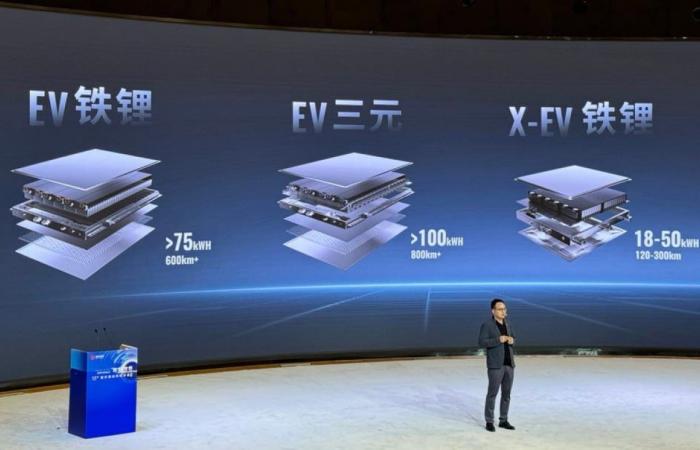Electric car news
The landscape of the automotive industry is changing. At the heart of this transformation is a major player: China. By taking control of the electric vehicle battery supply chain, the Middle Kingdom is redefining the rules of the global energy game. Let’s dive into the details of this bold strategy and its implications for the future of electric mobility.
The dizzying fall in commodity prices
Not long ago, the world was alarmed by a shortage of lithium and cobalt, essential components of lithium-ion batteries. Today, it is their overabundance that makes the headlines. This spectacular about-face is the work of a China determined to dominate the market.
The numbers speak for themselves:
- The price of cobalt rose from 80 dollars per kilo in 2022 to around 25 dollars today, a fall of more than 75%.
- Lithium experienced an even more impressive tumble, going from 70 dollars per kilo at the start of 2023 to around 11 dollars Currently.
This drastic decline can be explained by China’s massive investments in the production and recycling of these strategic materials. By flooding the market, Beijing literally caused world prices to collapse.
Chinese strategy: a game of chess on a global scale
Contrary to popular belief, China does not extract these minerals on its territory. Its strategy is much more subtle and is based on three pillars: buy, transform, dominate.
The country sources its lithium from the four corners of the globe – Australia, Chile, Bolivia, Argentina – and then transforms it in its ultra-modern factories. As for cobalt, it mainly comes from the Democratic Republic of Congo, where Chinese companies like the CMOC group have invested massively.
This approach allowed a phenomenal increase in production. In the Democratic Republic of Congo, for example, cobalt production increased from 15,000 tonnes to more than 100,000 tonnes annually in just five years. A growth reminiscent of the strategy already employed by China to dominate the silicon and solar panel market.
The consequences of undivided domination
This new situation completely disrupts the global energy equation. On the face of it, falling prices could accelerate the adoption of electric cars and the deployment of large renewable energy storage systems. A boon for the energy transition, you say?
Not so fast. If these cut prices make car manufacturers and consumers happy in the short term, they pose serious problems in the long term.
Mining companies outside China are struggling to remain competitive, discouraging investment in new sources of supply. Result ? Dependence on China is increasing. It is estimated that by 2025 the country could control a third of global lithium production. A prospect that sends shivers down the spines of many observers.
Innovation in danger?
Ironically, this abundance of cheap raw materials could hamper innovation. While high prices had pushed manufacturers to look for more sustainable alternatives, the return of cheap cobalt could encourage them to settle for it, to the detriment of potentially more ecological solutions.
Take the example of sodium batteries, which do not use lithium. Two models are currently in preparation in China. But with the price of lithium falling, the incentive to develop these alternatives could diminish.
The impact on the electric car market
For car manufacturers, this drop in raw material costs is a boon. It could significantly reduce the price of electric vehicles, making them more accessible to the general public.
Currently, for certain models, the battery alone represents 40% of the total price of the vehicle. A substantial reduction in the cost of batteries could therefore have a major impact on the final price of electric cars.
However, this situation also raises questions about manufacturers’ dependence on China. What would happen if Beijing suddenly decided to restrict its exports or increase its prices?
Towards a new geopolitics of energy
China’s control over the battery supply chain is redrawing the map of global energy power. While oil has long been at the heart of geopolitical issues, it is now lithium and cobalt which are crystallizing tensions.
This situation is reminiscent of OPEC’s domination of the oil market. But unlike oil, which is concentrated in a few countries, lithium and cobalt resources are more geographically dispersed. It is the control of the processing chain that gives China its decisive advantage.
Faced with this situation, the other powers are not remaining idle. The European Union and the United States are seeking to develop their own battery production and recycling sectors. But catching up with China’s lead promises to be a major challenge.
Ultimately, China’s electric vehicle battery strategy is double-edged. On the one hand, it accelerates the transition to cleaner mobility by making electric cars more affordable. On the other, it creates a potentially dangerous dependence on a single country.
The future of electric mobility will therefore be played out as much in laboratories and factories as in chancelleries. One thing is certain: the battle of the batteries has only just begun.
Written by Alexandra Dujonc
After studying electrical engineering, I worked on research and development projects aimed at improving the charging capacity of electric cars, which I made into my specialty! I put my in-depth knowledge on the subject of electric charging at your disposal.
React to the article







